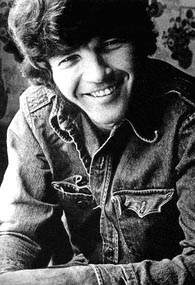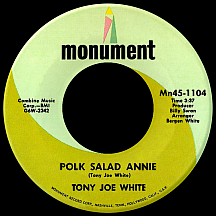TONY JOE WHITE
Polk Salad Annie
'The gator's got'cher granny...chomp!'...well, that's a gruesome way for "Nana" to meet her maker! Tony Joe White's songs are rife with descriptive phrases of this sort, drawn from the experiences of his pickin' cotton upraisin' in northern Louisiana...though let's hope some of the imaginative lyrics are exaggerated. "Polk Salad Annie," be she real or fictional, had a tough life growing up in the swamp with little to eat but plants that looked like turnip greens. 'Everybody said it was a shame...'cause her mama was-a workin' on a chain gang...a wretched, spiteful, straight-razor-totin' woman...' And so went one of the numerous narratives about life in the Creole State, back up in the woods or on the Bayou. Tony's whole being is soaked in Louisiana culture and his part-Cherokee heritage; there's much more to the music, and the man, than just this one killer song that became his signature hit in the summer of 1969.
While his family was musically inclined, Tony didn't begin to play guitar or harmonica until his teens, when he developed an obsession with Houston, Texas-based blues guitar great Lightnin' Hopkins. Blues, country and cajun music combined to shape the deep, gritty vocal style TJW (as loyal fans refer to him) called his own. In 1964, the 20-year-old led The Tony White Combo with friends Robert McGuffey and Jim Griffith. When hired for a nightclub gig in Kingsville, a small Texas town near the Gulf, a recording opportunity presented itself. By the time "Bad Mouth" came out on Corpus Christi's local J-Beck label in 1965, he was backed by different musicians and the act was called Tony Joe and the Mojos, a name more characteristic of Louisiana-bred superstition, one of the subjects he (and most every cajun country bluesman) utilized as a songwriter. Briefly calling his group Tony's Twilights, he also recorded with The Bad Seeds, a band from Corpus Christi. Another single on J-Beck, "Down the Road I Go," was simply credited to Tony Joe, these original efforts the key to reaching fans caught in the spell of southern blues and rock.
He traveled to Nashville in early 1967 and auditioned for Bob Beckham (a former Decca artist with a couple of pop hits to his credit), who liked what he heard and got him signed to his current label, Monument. Ray Stevens produced "Georgia Pines," a country-pop tune penned by Buddy Buie and John Rainey Adkins that had been recorded a few months earlier by soul singer Mighty Sam (that fall, The Candymen hit the charts with their version on ABC). "Watching the Trains Go By," a Dan Penn-Spooner Oldham song, rolled by about a year later. The White-penned flip side, "Old Man Willis," had a storytelling style and horn-backed arrangement almost identical to the hit that would eventually expose the singer to a national audience. His original compositions made the A sides starting with summer '68's "Soul Francisco," which had a measure of success in Europe but was ignored in the states.
Missourian Billy Swan, who'd written Clyde McPhatter's 1962 smash "Lover Please" (and later scored big as a singer with "I Can Help"), produced TJW's recordings starting in 1968, including "Polk Salad Annie," a hard sell when released in the fall. But positive reaction from clubgoers at Tony's shows kept it alive and in spring '69 it broke on the west coast (San Francisco, San Bernardino and even at the soul station in Los Angeles, KGFJ). A full album, Black and White, finally arrived and by mid-summer Tony's "southern greens" jam was in the Billboard top ten while "Willie and Laura Mae Jones," a song he'd composed about camaraderie among southern neighbors who happened to be of different races ('...they lived right down the road from us in a shack just like our shack'), hit the charts in a terrific Memphis-made version by Dusty Springfield.

The singing career of Tony Joe White peaked that summer...so who could have guessed he would still be making records and performing a half century later? The follow-up, "Roosevelt and Ira Lee (Night of the Mossacin)," was about a couple of southern boys messing around in the swamp and stealing chickens. "Mossacin" wasn't a misprint, it was just Tony's heavy-accented way of pronouncing the second word in "water moccasin"...a disagreeable lil' snake I've had my own near-miss experience with in Florida during a wayfaring phase of my youth. The single just missed the top 40, but another song from White's sophomore album ...Continued became hs biggest hit as a songwriter. Brook Benton zeroed in on "Rainy Night in Georgia" as soon as White's recording hit the street and his brilliantly melancholy cover version sparked a comeback for the South Carolinian hitmaker when it went top ten pop and number one R&B in early 1970.
Some minor hits kept Tony on the radio in 1970, including "High Sheriff," a disturbing tale of being in the wrong place at the wrong time (stay away from the local lawman's daughter!), "Save Your Sugar For Me" and a remake of Slim Harpo's itch-relief blues hit from 1966, "Baby Scratch My Back" (without the "baby" in the title). In '71 he left Monument for Warner Bros. Records and early work with producers Peter Asher, Jerry Wexler and Tom Dowd was well-received by fans and critics. In '73 he had a role in the movie Catch My Soul, a down-south interpretation of William Shakespeare's Othello, the only big-screen directorial effort by the star of TV's Secret Agent and The Prisoner, Patrick McGoohan.
TJW's compelling songwriting ability served him well in the 1970s and '80s. Artists who enjoyed hits with his songs include Elvis Presley ("For Ol' Times Sake" and "I've Got a Thing About You Baby" in '73 and '74), Joe Simon ("Easy to Love," 1977), Jacky Ward ("That's the Way a Cowboy Rocks and Rolls," 1980), Ray Charles ("3/4 Time," 1983) and Tina Turner ("Steamy Windows," 1989). His "Annie" fame carried him through a few more major labels (20th Century, Arista, Casablanca and Columbia) between the mid-'70s and mid-'80s. Afterwards, Tony Joe White regularly performed his brand of rocking rural southern soul while recording for more specialized companies.


